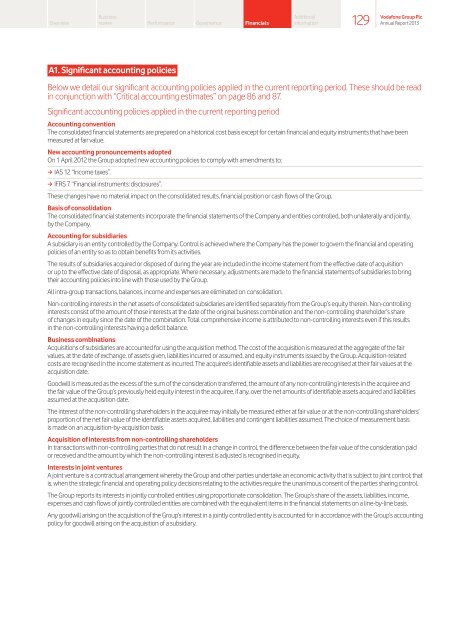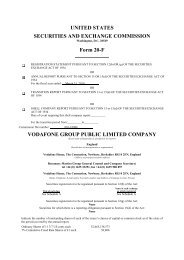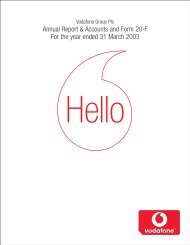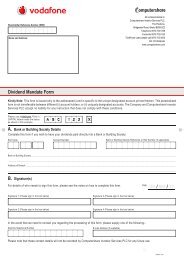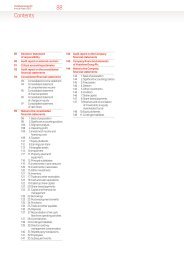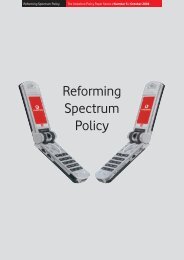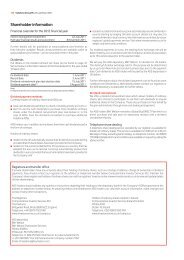The way ahead? - Vodafone
The way ahead? - Vodafone
The way ahead? - Vodafone
Create successful ePaper yourself
Turn your PDF publications into a flip-book with our unique Google optimized e-Paper software.
Overview<br />
Business<br />
review Performance Governance Financials<br />
A1. Significant accounting policies<br />
Additional<br />
information<br />
Below we detail our significant accounting policies applied in the current reporting period. <strong>The</strong>se should be read<br />
in conjunction with “Critical accounting estimates” on page 86 and 87.<br />
Significant accounting policies applied in the current reporting period<br />
Accounting convention<br />
<strong>The</strong> consolidated financial statements are prepared on a historical cost basis except for certain financial and equity instruments that have been<br />
measured at fair value.<br />
New accounting pronouncements adopted<br />
On 1 April 2012 the Group adopted new accounting policies to comply with amendments to:<br />
a IAS 12 “Income taxes”.<br />
a IFRS 7 “Financial instruments: disclosures”.<br />
<strong>The</strong>se changes have no material impact on the consolidated results, financial position or cash flows of the Group.<br />
Basis of consolidation<br />
<strong>The</strong> consolidated financial statements incorporate the financial statements of the Company and entities controlled, both unilaterally and jointly,<br />
by the Company.<br />
Accounting for subsidiaries<br />
A subsidiary is an entity controlled by the Company. Control is achieved where the Company has the power to govern the financial and operating<br />
policies of an entity so as to obtain benefits from its activities.<br />
<strong>The</strong> results of subsidiaries acquired or disposed of during the year are included in the income statement from the effective date of acquisition<br />
or up to the effective date of disposal, as appropriate. Where necessary, adjustments are made to the financial statements of subsidiaries to bring<br />
their accounting policies into line with those used by the Group.<br />
All intra-group transactions, balances, income and expenses are eliminated on consolidation.<br />
Non-controlling interests in the net assets of consolidated subsidiaries are identified separately from the Group’s equity therein. Non-controlling<br />
interests consist of the amount of those interests at the date of the original business combination and the non-controlling shareholder’s share<br />
of changes in equity since the date of the combination. Total comprehensive income is attributed to non-controlling interests even if this results<br />
in the non-controlling interests having a deficit balance.<br />
Business combinations<br />
Acquisitions of subsidiaries are accounted for using the acquisition method. <strong>The</strong> cost of the acquisition is measured at the aggregate of the fair<br />
values, at the date of exchange, of assets given, liabilities incurred or assumed, and equity instruments issued by the Group. Acquisition-related<br />
costs are recognised in the income statement as incurred. <strong>The</strong> acquiree’s identifiable assets and liabilities are recognised at their fair values at the<br />
acquisition date.<br />
Goodwill is measured as the excess of the sum of the consideration transferred, the amount of any non-controlling interests in the acquiree and<br />
the fair value of the Group’s previously held equity interest in the acquiree, if any, over the net amounts of identifiable assets acquired and liabilities<br />
assumed at the acquisition date.<br />
<strong>The</strong> interest of the non-controlling shareholders in the acquiree may initially be measured either at fair value or at the non-controlling shareholders’<br />
proportion of the net fair value of the identifiable assets acquired, liabilities and contingent liabilities assumed. <strong>The</strong> choice of measurement basis<br />
is made on an acquisition-by-acquisition basis.<br />
Acquisition of interests from non-controlling shareholders<br />
In transactions with non-controlling parties that do not result in a change in control, the difference between the fair value of the consideration paid<br />
or received and the amount by which the non-controlling interest is adjusted is recognised in equity.<br />
Interests in joint ventures<br />
A joint venture is a contractual arrangement whereby the Group and other parties undertake an economic activity that is subject to joint control; that<br />
is, when the strategic financial and operating policy decisions relating to the activities require the unanimous consent of the parties sharing control.<br />
<strong>The</strong> Group reports its interests in jointly controlled entities using proportionate consolidation. <strong>The</strong> Group’s share of the assets, liabilities, income,<br />
expenses and cash flows of jointly controlled entities are combined with the equivalent items in the financial statements on a line-by-line basis.<br />
Any goodwill arising on the acquisition of the Group’s interest in a jointly controlled entity is accounted for in accordance with the Group’s accounting<br />
policy for goodwill arising on the acquisition of a subsidiary.<br />
129<br />
<strong>Vodafone</strong> Group Plc<br />
Annual Report 2013


